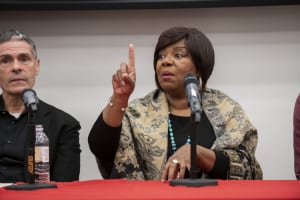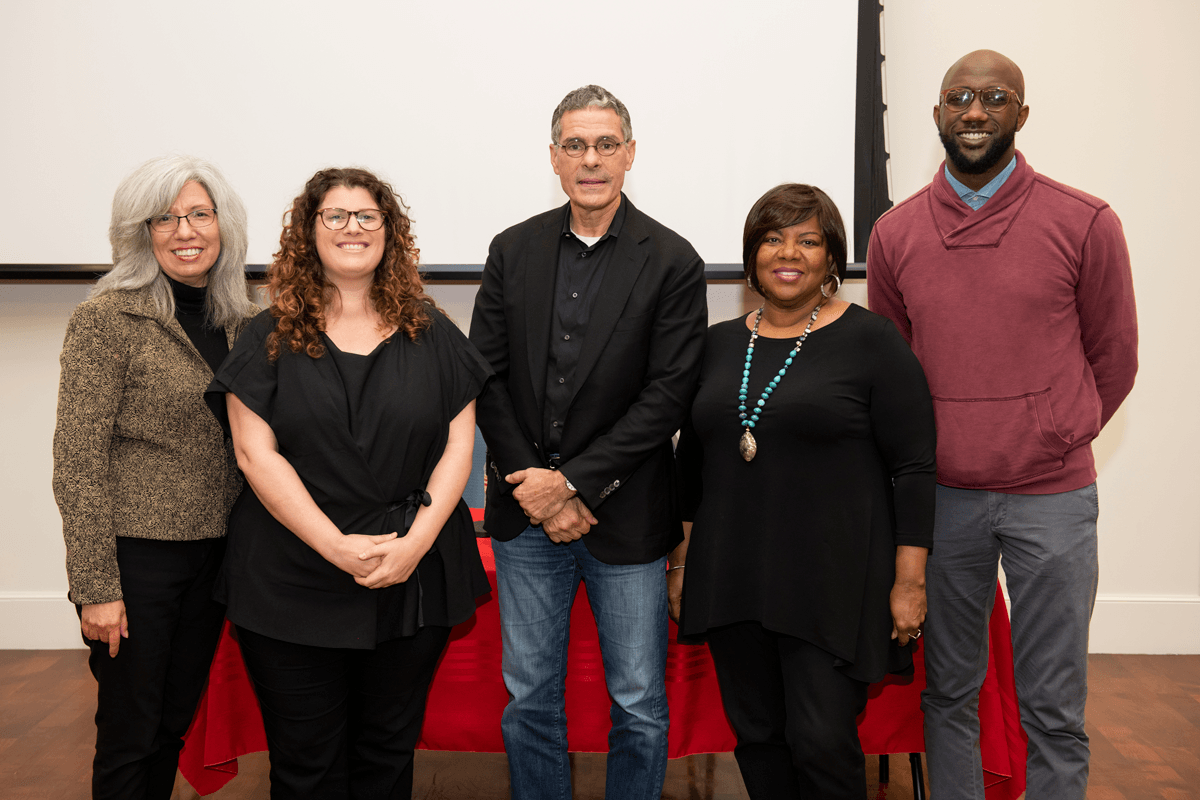In theory, schools should put children on a path toward college or a good job. In reality, for far too many children school leads to incarceration.
Experts call the trend the “school-to-prison pipeline” — the disproportionate tendency of young adults from disadvantaged backgrounds to end up incarcerated – and they blame the trend on increasingly harsh school and municipal policies.
That was a key focus of an interdisciplinary dialogue, “The ABC’s of Theology and Criminal Justice Reform on the Lives of School Children of Color,” at Perkins School of Theology on October 15. Despite a downpour in Dallas that evening, more than 40 students, alumni and other concerned citizens turned up for the program.
The event was jointly sponsored by Perkins, the school’s Center for the Study of Latino/a Christianity and Religions, and the United Methodist Church’s General Commission on Religion and Race.

“The school-to-prison pipeline is a metaphor for: failing public schools, zero tolerance discipline with policing presence in schools, disciplinary alternative education programs, court involvement and juvenile detention centers, and priority influence given to incarceration over education for a subdivision of American school children and youth,” said Dr. Harold Recinos, Perkins professor of church and society and the president of the Oscar Romero Center for Community Health & Education in Dallas.
Zero tolerance policies, he added, tend to punish children of color excessively for “culturally normative” behavior and put children on a path to more trouble, rather than better behavior. For Recinos, that problem is personal.
“I was one of those ‘bad kids’ in school,” he told the group. “I was very disruptive. We didn’t have zero tolerance policies then, luckily, or I wouldn’t be here today.”

Cynthia Wallace, a recent Perkins graduate and a program coordinator at the Juvenile Detention Center in Dallas County, noted that ten ZIP codes in the Dallas area have been relabeled as “the cradle-to-prison pipeline ZIP codes.”
“Kids who are born and live in one of those ZIP codes are at very high risk of becoming involved with the juvenile system, and/or graduating to adult prison,” she said. Wallace cited a 2008 study of one of those areas, the 75216 ZIP code, which showed that only two students attending the local high school were prepared for college, yet 681 individuals were sent to prison. That study also reported that, in the combined high schools in the ten ZIP codes, a total of 26 students were prepared for college while 3,100 individuals were sent to prison.
Wallace added that Dallas County’s jail, the Lew Sterrett Justice Center, has one floor just for 17-year-olds who have been arrested.
“Texas is one of only two states where 17-year-olds are treated as adults in criminal cases,” said Cynthia Alkon, a visiting professor from Texas A&M at SMU’s Dedman School of Law. “Texas is out of step. There are legal structures that need to change. Without talking about the legal structures, we’re missing a key piece. That’s one key change that churches and other faith groups could advocate for.”

Edwin Robinson, executive director of Faith in Texas, told the audience that reform to eliminate the pipeline can’t be piecemeal.
“The school-to-prison pipeline is not some sort of thing that is separate from what it means to be educated in the United States of America,” he said. “It IS the education system.”
Robinson added, “When people ask, ‘What do we replace it with?’ I give the same answer God gave the children of Israel: go. There were no GPS coordinates to the promised land. One of the things that stops us from dismantling the school-to-prison pipeline is that we want to have all the answers before we start. We don’t have all the answers. But we do know that what we have is making us sick.”
Recinos cited examples where students’ minor misbehavior was unjustly criminalized, such as 12-year-old Alexa Gonzalez in New York, who wrote “I love my friends Abby and Faith” on her desk with an erasable marker. Considering this an act of vandalism, she was handcuffed, arrested and detained at a New York City precinct.
“What I hope attendees took away was the importance of paying attention to your local school boards and what is happening inside our schools,” said Isabel N. Docampo, director of the Center for the Study of Latino/a Christianity and Religions at Perkins School. “It’s relevant not only if you have children in school but for the whole of society. How we treat students has a direct impact on our county’s health, culturally, morally and economically.”
Ubuntu Music
The evening program opened with a mini-concert by Ubuntu Music Project, an after-school music program for underserved students in Dallas. Their faces focused in deep concentration, the young violinists presented an instrumental rendition of “We Shall Overcome.”

Ubuntu’s founder and executive director is Perkins graduate Nicole Melki, with Grace United Methodist Church in east Dallas providing support. Most of the participants in the program are Latino children. (Ubuntu is an African principle of the interconnectedness of all people, often expressed as “I am because we are.”)
“These are kids who lack food resources, who suffer from intergenerational trauma from poverty,” she told the audience. “Music is a way of awakening hope and teaching tenacity to strive for success. Otherwise, these children can end up believing that success is only for the privileged. Hopelessness becomes internalized.”
Melki was inspired by her own experience to start Ubuntu. The child of refugees, she said she felt “I was too far behind and could never make something of myself. But everything changed at age 11, when I started playing the violin.”
Melki shared stories of students who were able to surmount obstacles and earn coveted spots in desirable magnet schools through their violin skills – and called on others to find their ways to serve.
“We were able to transform music into empowerment,” she said. “We bring liberation to the oppressed through music. Where is your call to bring liberation to the oppressed? Everybody in this room is called to be an agent of hope.”
